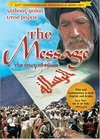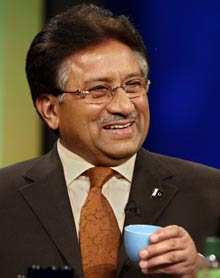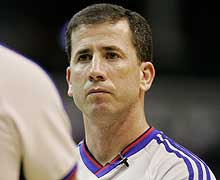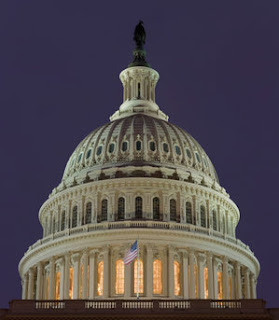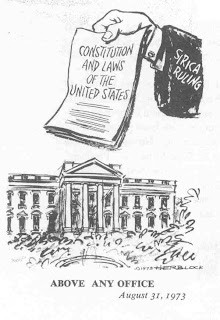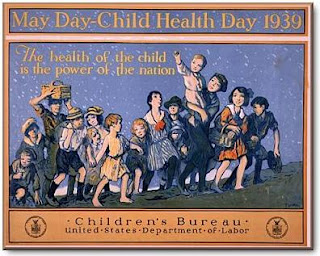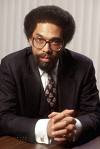I am probably not alone in wondering what these labels even mean anymore. What does it mean to be a conservative in an era when "conservative" president George W. Bush is radically spending us into bankruptcy and thumbing his nose at the law? What does it mean to be "conservative" in an era when "conservatives" are radically stacking the court in order to use judicial review to dictate to the country a point of view supported by fundamentalist churches? I could go on, but you get the point.
I have considered myself a liberal at times, and I have considered myself a conservative at times. I have considered myself 'middle of the road' at times. It's not because my beliefs are changing radically, but because I keep finding myself having to adjust to the political winds.
To begin with, almost all Americans are liberals, whether they hate the word or not. Liberalism is a term that is derivative from liberty, or freedom. So, freedom-loving individuals are liberals. And that is why I am steadfastly a liberal. Big time.
But because I am a freedom-loving liberal, I am a libertarian to some extent. I believe in the principle first annunciated most clearly by John Locke, and followed upon by John Stuart Mill's
On Liberty: 'the principle of liberty' is that we should be free to do whatever we want (without constraint from the government) unless we are hurting someone else by our actions. I am a classical liberal in this regard, and not a true libertarian (which is rather too much like an anarchist for my tastes), because I believe the government
does have a genuine role in protecting individual liberties.
But because I have this penchant for defending liberties, I find myself in league with "conservatives" quite often. Conservative? What is a conservative? In the eighteenth- and nineteenth-centuries, to be a liberal was to espouse the type of government that we were establishing in the United States of America. To be a conservative was to defend the monarchy against its loss of power. There are few such "conservatives" left in America. With regard to foreign policy, Edmund Burke established a conservative tradition that suggests that we should be cautious about imposing our view of the world on other cultures, because tradition is important. To Burke, the classical liberal tradition had been grown carefully within English and American tradition over a long period of time, and only that careful growth could sustain democratic institutions. George W. Bush would do well to read a little Burke, because he is most definitely not a conservative in that tradition. He is, rather, a radical imperialist, who seems bent on imposing American will upon the world by force, and on accumulating executive power against the traditional methods of checks and balances that has kept this country healthy and great for more than 200 years.
During the late 19th-century, and early 20th-century, one could argue that American conservativism was reactionary in the sense of wanting to not see progress for women, or laborers, or people of non-Caucasian ethnicity. It defended the existing hierarchies against all comers. Today's "conservatism" does have quite a lot in common with this conservatism, and I want nothing to do with it. It is indefensible to favor existing hierarchies "just because" it's the way things have been. Anyone who seeks justice should seek justice for
all people, and that is a
liberal and not a conservative principle, traditionally-speaking.
But there's another strand of "conservativism" that sprung up in the United States in the 20th-century. And that brand of "conservativism" has liberal roots. It came to be known as "conservative" because it defended the American tradition against sweeping economic changes that they believed would destroy the greatness of America. Its message was largely economic, and was formed in the face of communist and socialist challenges, many of whose policies were enacted by Franklin Delano Roosevelt's administration in response to the Great Depression. It is
that brand of increasingly government-controlled economics that came to be identified more and more as "Liberal," and it has become a position that is increasingly difficult to defend. I am not a liberal in that sense, and have much in common with "conservative" thought... to the extent that it is freedom-loving, and defends individual liberties... and thus, is classically liberal.
Confused? I hope not.
Have the terms just been switched? Are conservatives the true liberals?
In some cases, people who call themselves "conservative" today are indeed the defenders of liberalism. And this misled me for a time in my life to think of myself as "conservative." But the issue is a lot more complex than we'd usually like to think. The labels are so misleading.
I have friends who consider themselves "conservatives," who otherwise : ) are good people. Why do they consider themselves "conservative"? Well, first of all, because it's the label that most people who think like they do have embraced. It has become short-hand for a number of policies that are mostly culturally-conservative. They believe in the America of "mom and apple pie." There is a great tradition of church-going, God-fearing, freedom-loving America that is willing to defend its right-to-be with a strong military when necessary. These folks believe in hard work, and resent it when they are asked to pay tax dollars to support a system that builds up what they see as "needless bureaucracies," and to give hand-outs to those they see as people who are unwilling to work. And they've seen too many examples of people taking advantage of a large bureaucratic welfare state to see it as capable of distinguishing the truly needy amongst us. I'm sure that was the appeal of Bush's call to a "compassionate conservativism," and "faith-based initiatives." It sounds good to those of us who distrust large bureaucracies.
Morally, these conservatives cannot stomach abortion-on-demand. The religious conservative is very conservative sexually, believe that sex is ideally for marriage alone, and therefore have no patience with seeing abortion as a remedy to what they see as sexual misconduct.
Again, cultural conservativism reacts against gay rights, which religious conservatives also believe is a result of sexual misconduct.
Being religiously and sexually liberal, I am out of step with this aspect of cultural conservatism, but I understand it.
The religious conservative is, at bottom, much more interested in having a 'theocracy' than a 'liberal democratic republic', though even many of them don't realize this, yet. The issue here is actually
fundamentalism.A typical liberal reaction to the current debate about the role of religion in politics is to say that religion has no place in politics. But that is ridiculous. Neither the establishment clause nor the exercise clause of the 1st Amendment say that one should leave one's religion out of voting decisions. One must use one's moral considerations as a basis for public policy. And if one's religious views inform one's moral considerations, then one can hardly leave their religion behind. But what is the nature of one's religion? If you're a Christian fundamentalist, then much, but not all, of your ethics is decided by the Bible. The only problem there is when there are conflicts in scripture or conflicts in the interpretation of scripture. But much of it is pretty straight forward about ethics.
Now if you're a fundamentalist on these matters, you want the Government to be in line with the Bible, which you see as the Word of God. That pretty much ends a lot of debate. Because if you have the infallible Word of God in front of you, then you want your country run by God, and not some mortal human. So, in other words, you want a theocracy, and not a liberal democratic republic. Because our country was formed partly on the believe that we require reasoned debate and compromise on these issues, and that there is no privileged point of view from which to make political decisions. So, if you're a liberal Christian, like I am, who believes much more in the Spirit of the law than the Letter of it, then you can easily be both a Christian and a supporter of the liberal, democratic republic that the 'founders' established. Because liberal Christians, like myself, believe that we have to think for ourselves. We believe that the Bible was written by men like us, and that we humans are fallible. We believe that we have to interpret what we read. And we believe that our interpretations must be guided by the Spirit of love and compassion, and not intolerant claims to "know" the truth. ("Pastor John said that you shouldn't wear make-up, because that's what God says, and so it's the Truth!") I personally suspect that God's a little more flexible than many religious conservatives think.
Toward the end of the 20th-century, the neo-conservative movement was born. The neo-cons are a different breed, and much of what we are shocked by in the Bush Administration comes from an alliance of the neo-cons and the religious conservatives. The neo-conservative movement was born on the backs of the conservative economic agenda that I have already talked about. But what sets the neo-conservative agenda apart is that it is largely based around an aggressive foreign policy that sees Israel as the center of the storm. Israel must be defended at all costs, and anything the United States can do to defend Israel, including adventurism in the Middle East. That is what we are seeing now. We are seeing people like Dick Cheney, Paul Wolfowitz, and Donald Rumsfeld leading us into a disastrous foreign policy that is imperialist and adventurist, and ultimately at an economic cost that is anything but "conservative." The alliance with religious conservatives is formed in part because the neo-cons are taking advantage of the fact that Biblically-minded people are eager to defend Israel. Because Israel is, in the Bible, God's "chosen people," the fundamentalist Christian identifies with Israel, and wants to see Israel be victorious against its enemies. The neo-cons couldn't really care less about issues like gay marriage and the abolition of abortion, but they use them to advantage in order to come to positions of power in Washington, D.C. And the terrorist attack on September 11, 2001, was all the neo-cons needed to seal the deal. I don't know if it was planned by them, or allowed to happen by them, or if it was as much a shock as it was to the rest of us, but the fact is that it was extremely convenient for the neo-conservative agenda to build upon... to the disgust of many of us.
It's enough to make anyone's head spin trying to keep up with all of this, I know.
To personalize this in conclusion, I, like some of my friends, believe in that world of "mom and apple pie," and I'm ready "to defend it against all enemies, foreign and domestic." I'm concerned about some of the changes that I've seen in this country, and want to preserve some of the older values that we've cherished. I believe in change coming slowly, and being cautious about rapid change. I believe that there can be such a thing as too-much-government, and that the government is the most likely tyrant of all. I don't believe the government should try to control the economy. All of this puts me in league with many conservatives.
And like many conservatives, I'm very concerned about the lack of an enforced immigration law in this country. But I believe that we don't have one because our political system is driven by the money of big business interests. And that's one of the biggest things that sets me against the current conservative movement. It's a complex issue, but conservatives are willing to allow labor to stand unprotected against the vast power of big business. It allows big business to be treated as a person with the protections that liberalism entitles a person to. And in so doing, the middle class is currently being eradicated from the American political scene. And I see nothing "conservative" about that.
Big business wants massive immigration in order to lower the cost of labor in the United States. And I believe that mainstream conservatives, while bothered by this, don't fully understand what is happening, and support Republicans anyway. Or, on balance, as long as cheap goods can be bought from Walmart, and Republicans are the party against abortion-on-demand, there is, on balance, not an overwhelming concern about the issue of cheap labor in America.
Big business wants a war in Iraq, because it requires cheap energy to keep its engines turning. It benefits from a well-ordered capitalist Middle East. And it also benefits from the thriving war industry. So, big business gets its war. And thrown horrible lies by the Bush administration about how going into Iraq is about a "war on terrorism," otherwise good, conservative, hard-working, and moral Americans are willing to spend their blood and treasure to kill a lot of innocent people and expand the American Empire.
Liberalism is about freedom. Sometimes that requires that we tolerate behavior that we wouldn't personally condone. We allow rappers, for instance, to use filthy language in public media to express themselves about horrible deeds that they either have, or want to, perpetrate against other human beings. We allow horribly misleading advertising on television and on radio, and depend on the good judgment of Americans to counter its harmful effects. I am willing to accept the tolerance that liberalism entails. Because, not to do so, would be to set some fallible being in a position of a judging what can and cannot be said, and in the long run, our society thrives because of the free expression of the thoughts of our fellow citizens.
Good government is hard to come by. And the government that governs least is often the best government. The nature of the beast is such that it accumulates autocratic power that, in the end, fails to distinguish the little nuances of the daily lives of its citizens. The bigger it is, the more it is often out of touch with the true needs of its people. So, we must guard against government. But that doesn't mean that government is entirely bad. Government is a necessary... I don't want to say evil... it is a necessary
corrective in human society. Human beings require systems to organize themselves in, and--like it or not--that involves compromise with other human beings in our communities. We are not, in the end, solitary individuals or islands unto ourselves. We are important in ourselves, but we find our importance in communal interaction with other human beings. And this interaction needs to be coordinated to some degree.
That's why I'm a big fan of E.F. Schumacher's principle of
economies of scale. There are some things that big government can do well. But they are few in number. Middle-sized governments are necessary for some purposes. But the most important government is
local, which is where the rubber meets the road. It is a matter of vision. For most tasks, it is local officers who can see what is going on in their communities. But for other matters, state officials can see the bigger picture best. For other matters, national officials can see and coordinate what is best for the whole.
We need the government to perform certain functions. Even Milton Friedman acknowledged that. And I would often agree with critics who believe that certain government entities ought to be abolished due to inefficiency. But wholesale privatization is not the answer either. Because big business is another threat to civil liberties. True individuals, or persons, can't compete with that artifice of law, the persons of big business. People need protection from being dominated, and having their lives ruined by, the mechanisms of the market. The key is to use government to prevent the accumulation of power in too few hands, including any agency of government. One of the government's primary roles is to protect civil liberties from encroachment by business. And the roles of the legislative, judiciary, and executive is to protect us from abuse by its sister branches of government.
I am a classical liberal who believes in freedom, and who believes in limited government by the people and for the people. I am a classical liberal who believes in tolerance of what we do not understand or appreciate, so long as people are not hurting other people in the process.
But that's the rub: when is one individual hurting another? That should be the chief matter of public debate. It is not always easy to discern. But in some cases, it is, and that is where we must begin.
So, in conclusion, I am a liberal supporter of the protection of individual human rights, and of the strident, progressive use of government power to create an equitable playing field in an otherwise free market. And I am a conservative defender of any attempt to alter this fundamentally free system of government that the founders established. Is there any wonder, then, that these labels create confusion?
